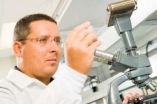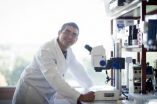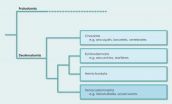(Press-News.org) LOS ANGELES – Increasing puromycin-sensitive aminopeptidase, the most abundant brain peptidase in mammals, slowed the damaging accumulation of tau proteins that are toxic to nerve cells and eventually lead to the neurofibrillary tangles, a major pathological hallmark of Alzheimer's disease and other forms of dementia, according to a study published online in the journal, Human Molecular Genetics.
Researchers found they could safely increase the puromycin-sensitive aminopeptidase, PSA/NPEPPS, by two to three times the usual amount in animal models, and it removed the tau proteins in the neurons. Removing the tau proteins restored neuronal density and slowed down disease progression. Researchers detected no abnormalities caused by the increase in PSA/NPEPPS, suggesting that elevating PSA/NPEPPS activity may be a viable approach to treat Alzheimer's disease and other forms of dementia, known a tauopathies.
"Our research demonstrated that increasing the brain enzyme known as PSA/NPEPPS can effectively block the accumulation of tau protein that is toxic to nerve cells and slow down the progression of neural degeneration without unwanted side effects," said Stanislav L. Karsten, PhD, the corresponding author for the study and a principal investigator at Los Angeles Biomedical Research Institute at Harbor-UCLA Medical Center (LA BioMed). "These findings suggest that increasing this naturally occurring brain peptidase, PSA/NPEPPS, may be a feasible therapeutic approach to eliminate the accumulation of unwanted toxic proteins, such as tau, that cause the neural degeneration associated with the devastating effects of Alzheimer's disease and other forms of dementia."
Alzheimer's disease affects 2 million to 4 million Americans, and their ranks are expected to grow to as many as 14 million by the middle of the 21st century as the population ages.
The potential for PSA/NPEPPS to protect neurons from degeneration was first reported in a 2006 issue of the journal, Neuron. At that time, researchers hypothesized that PSA/NPEPPS may be a natural mechanism for protecting neurons. Dr. Karsten, who was the lead author of the 2006 study, said the new study is the first to provide the data confirming the neuroprotective role of PSA/NPEPPS in mammals.
INFORMATION:
The research was supported by the UCLA Alzheimer's Disease Research Center, the CurePSP Society, RGK Foundation, UCLA Older Americans Independence Center, Liu Young Investigator Award, Alzheimer's Association, LA BioMed and NARSAD, the brain and behavior research fund. The research paper may be accessed at: http://hmg.oxfordjournals.org/content/early/2011/02/14/hmg.ddr065.full.pdf+html
About LA BioMed
Founded in 1952, LA BioMed is one of the country's leading nonprofit independent biomedical research institutes. It has more than 150 principal researchers conducting studies into improved treatments and cures for cancer, inherited diseases, infectious diseases, illnesses caused by environmental factors and more. It also educates young scientists and provides community services, including immunization and childhood nutrition programs. LA BioMed is academically affiliated with the David Geffen School of Medicine at UCLA and located on the campus of Harbor-UCLA Medical Center. For more information, please visit www.LABioMed.org
Increasing brain enzyme may slow Alzheimer's disease progression
LA BioMed study finds damaging accumulation of tau proteins removed
2011-02-17
ELSE PRESS RELEASES FROM THIS DATE:
Hip, thigh implants can raise bone fracture risk in children
2011-02-17
Children with hip and thigh implants designed to help heal a broken bone or correct other bone conditions are at risk for subsequent fractures of the very bones that the implants were intended to treat, according to new research from Johns Hopkins Children's Center.
Findings of the Johns Hopkins study, based on an analysis of more than 7,500 pediatric bone implants performed at Hopkins over 15 years, will be presented Feb. 16 at the annual meeting of the American Academy of Orthopaedic Surgeons.
Although the absolute risk among the patients was relatively small — nine ...
Erg gene key to blood stem cell 'self-renewal'
2011-02-17
Scientists from the Walter and Eliza Hall Institute have begun to unravel how blood stem cells regenerate themselves, identifying a key gene required for the process.
The discovery that the Erg gene is vitally important to blood stem cells' unique ability to self-renew could give scientists new opportunities to use blood stem cells for tissue repair, transplantation and other therapeutic applications.
Professor Doug Hilton, Dr Samir Taoudi and colleagues from the institute's Molecular Medicine and Cancer and Haematology divisions led the study. Dr Taoudi said the research ...
Xenacoelomorpha -- a new phylum in the animal kingdom
2011-02-17
An international team of scientists including Albert Poustka from the Max Planck Institute for Molecular Genetics in Berlin has discovered that Xenoturbellida and the acoelomorph worms, both simple marine worms, are more closely related to complex organisms like humans and sea urchins than was previously assumed. As a result they have made a major revision to the phylogenetic history of animals. Up to now, the acoelomate worms were viewed as the crucial link between simple animals like sponges and jellyfish and more complex organisms. It has now emerged that these animals ...
Tau-induced memory loss in Alzheimer's mice is reversible
2011-02-17
VIDEO:
To test their capacity to learn, the mice are trained to find an underwater platform which is not visible to them from the edge of a water basin. The swimming...
Click here for more information.
Amyloid-beta and tau protein deposits in the brain are characteristic features of Alzheimer disease. The effect on the hippocampus, the area of the brain that plays a central role in learning and memory, is particularly severe. However, it appears that the toxic effect of tau ...
Insects hold atomic clues about the type of habitats in which they live
2011-02-17
Scientists have discovered that insects contain atomic clues as to the habitats in which they are most able to survive. The research has important implications for predicting the effects of climate change on the insects, which make up three-quarters of the animal kingdom.
Applying a method previously only used to examine the possible effects of climate change on plants, scientists from the University of Cambridge can now determine the climatic tolerances of individual insects. Their research was published today, 16 February, in the scientific journal Biology Letters.
Because ...
Researchers link gene mutations to Ebstein's anomaly
2011-02-17
Ebstein's anomaly is a rare congenital valvular heart disease. Now, in patients with this disease, researchers of the Academic Medical Center Amsterdam in the Netherlands, the University of Newcastle, UK and the Max Delbrück Center for Molecular Medicine (MDC) Berlin-Buch have identified mutations in a gene which plays an important role in the structure of the heart. The researchers hope that these findings will lead to faster diagnosis and novel, more specifically targeted treatment methods (Circulation Cardiovascular Genetics, DOI: 10.1161/CIRCGENETICS.110.957985)*.
Ebstein's ...
Build your online networks using social annotations
2011-02-17
Researchers at Toshiba are working on a way of finding clusters of like-minded bloggers and others online using "social annotations". Social annotations are the tags and keywords, the comments and feedback that users, both content creators and others associate with their content. Their three-step approach could help you home in on people in a particular area of expertise much more efficiently and reliably than simply following search engine results. The same tools might also be used in targeted marketing.
Users of photo gallery sites, such as Flickr (http://www.flickr.com/) ...
Water softeners not found to improve childhood eczema
2011-02-17
The first study of its kind in the world — involving 336 children aged between six months and 16 years old — has shown that installing a water softener for three months brings no additional relief for eczema sufferers.
Up to one fifth of all children of school age have eczema, along with about one in 12 of the adult population. Anecdotal reports from patients have suggested that hard water may worsen atopic eczema. Population surveys have also suggested a possible link between atopic eczema prevalence and the degree of water hardness.
It had been hoped that water softeners ...
Treatment for manic-depressive illness restores brain volume deficits
2011-02-17
Philadelphia, PA, 16 February 2011 - Lithium, introduced in the late 1940's, was the first "wonder drug" in psychiatry. It was the first medication treatment for the manic and depressive episodes of bipolar disorder and it remains among one of the most effective treatments for this disorder.
In the past 15 years, as molecular mechanisms underlying the treatment of bipolar disorder began to emerge, basic research studies conducted in animals began to identify neuroprotective and perhaps neurotrophic effects of this important medication.
The identification of these ...
Study looks into evolution of breast cancer in Spain
2011-02-17
Pioneering Spanish provinces in terms of early prevention of breast cancer, such as Navarre and the Basque Country, record lower death rates, although the trend is towards the figures levelling out all over Spain. These are the results of a study carried out by Spanish researchers, which analyses the number of women who died between 1975 and 2005.
"The Canary Islands, Balearic Islands, some parts of Catalonia, Valencia and Murcia, as well as the south west region, have higher breast cancer death rates, although there is a trend towards the geographical differences disappearing", ...
LAST 30 PRESS RELEASES:
ASU researchers to lead AAAS panel on water insecurity in the United States
ASU professor Anne Stone to present at AAAS Conference in Phoenix on ancient origins of modern disease
Proposals for exploring viruses and skin as the next experimental quantum frontiers share US$30,000 science award
ASU researchers showcase scalable tech solutions for older adults living alone with cognitive decline at AAAS 2026
Scientists identify smooth regional trends in fruit fly survival strategies
Antipathy toward snakes? Your parents likely talked you into that at an early age
Sylvester Cancer Tip Sheet for Feb. 2026
Online exposure to medical misinformation concentrated among older adults
Telehealth improves access to genetic services for adult survivors of childhood cancers
Outdated mortality benchmarks risk missing early signs of famine and delay recognizing mass starvation
Newly discovered bacterium converts carbon dioxide into chemicals using electricity
Flipping and reversing mini-proteins could improve disease treatment
Scientists reveal major hidden source of atmospheric nitrogen pollution in fragile lake basin
Biochar emerges as a powerful tool for soil carbon neutrality and climate mitigation
Tiny cell messengers show big promise for safer protein and gene delivery
AMS releases statement regarding the decision to rescind EPA’s 2009 Endangerment Finding
Parents’ alcohol and drug use influences their children’s consumption, research shows
Modular assembly of chiral nitrogen-bridged rings achieved by palladium-catalyzed diastereoselective and enantioselective cascade cyclization reactions
Promoting civic engagement
AMS Science Preview: Hurricane slowdown, school snow days
Deforestation in the Amazon raises the surface temperature by 3 °C during the dry season
Model more accurately maps the impact of frost on corn crops
How did humans develop sharp vision? Lab-grown retinas show likely answer
Sour grapes? Taste, experience of sour foods depends on individual consumer
At AAAS, professor Krystal Tsosie argues the future of science must be Indigenous-led
From the lab to the living room: Decoding Parkinson’s patients movements in the real world
Research advances in porous materials, as highlighted in the 2025 Nobel Prize in Chemistry
Sally C. Morton, executive vice president of ASU Knowledge Enterprise, presents a bold and practical framework for moving research from discovery to real-world impact
Biochemical parameters in patients with diabetic nephropathy versus individuals with diabetes alone, non-diabetic nephropathy, and healthy controls
Muscular strength and mortality in women ages 63 to 99
[Press-News.org] Increasing brain enzyme may slow Alzheimer's disease progressionLA BioMed study finds damaging accumulation of tau proteins removed


